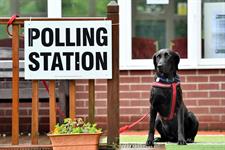Charities should read the new Non-Party Campaigner Code to “feel equipped” ahead of the upcoming election period, the chair of the Charity Commission has urged.
Orlando Fraser, chair of the Charity Commission, and John Pullinger, chair of the Electoral Commission, have stressed the importance of knowing the new code’s implications for the charitable sector, in a blog post, published today.
The code gives statutory guidance to help non-party campaigners, including charities, in their operations during the UK election period.
Fraser and Pullinger said in a joint statement: “Charities have a proud record of engaging in public debate and campaigning on behalf of their purposes, which is entirely legitimate.
“Doing so consistently with the legal framework is crucial to public confidence in your political campaigning and to trust in charities more generally.”
The chairs said that charities “need to know” about the new code, which comes into effect from today (1 December).
“In addition to a charity’s continuing obligations under normal charity law, electoral law requires charities to register as non-party campaigners if they spend over a certain amount on regulated campaign activities in the 12 months leading up to the next election,” they said.
The chairs noted that according to electoral law, spending on certain activities carried out by charities can be regulated if it can be “reasonably regarded” as intended to influence people’s voting choices. These regulated campaigning activities count towards the charity’s spending limit.
Charities will be required to register with the Electoral Commission as non-party campaigners if they spend more than £10,000 on regulated campaign activities and may be required to provide financial returns after the election, the chairs said.
The blog post also notes that the law now requires an imprint to be included on digital material that falls under the definition of regulated campaign activities.
“An imprint tells voters who is responsible for publishing and promoting campaign material. This means that many types of digital material, such as social media adverts and posts, will require an imprint,” the chairs said.
For example, a charity’s paid-for digital advert will need an imprint if it promotes an outcome in an election or promotes or criticises an elected office-holder.
The blog post also points organisations to the charity regulator’s guidance on campaigning and political activity, and its social media guidance.
“We want to make sure you feel equipped to enter the next election period, undertaking any campaigning to advance your charity’s purposes, with confidence.”
The chairs stressed that the aim behind this legislation is not to limit campaigning but to “ensure that there is transparency around key campaigning activity”.
They said: “Charities hold a unique position in law, and can and should model a better kind of discourse while championing their important work. If you do choose to engage, we expect you to do so in a manner that is respectful and tolerant and in a tone that reflects your standing as a registered charity.”
